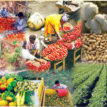
With high prices of food and subsistence farming largely practiced across the country with the least use of machines for food production, the Federal Government, yesterday, expressed readiness to galvanize food production with 60, 000 tractors and other agricultural interventions.
This was disclosed by the Minister of Agriculture and Rural Development, Mohammed Nanono, while receiving participants of the Senior Executive Course (SEC) NO 43(2021) of the National Institute for Policy and Strategic Studies (NIPSS), Kuru, Plateau State, at the headquarters of the Ministry.
According to Nanono, the proposed 60,000 tractors will drive agric mechanization that would revolutionize the sector across various value chains and will attract more investments and personnel in food production, supply, distribution, and access that would lead to availability and affordability.
He also maintained that the government has put in place measures that would accelerate food production and that the current hike in the price of food items across the country is currently being addressed, especially from the security perspective.
He maintained that the mechanisation programme of the Federal Government would metamorphose into a paradigm shift from subsistence practice to commercial agro-industrial farming.
He added that the shift will bring about massive food production, procurement of agricultural processing plants, fertilizer production, enhanced value chains, and among others.
Speaking further the Minister asserted that the move on mechanization would enhance local technologies evolution with over 600 Private Sector Driven Services centers, equipped, tractors, farming implements, storage, and IT Facilities.
He said: “This would address the challenge of feeding the nation’s growing population and achieving food sustainability, create jobs for teeming Nigerian youths, and boost the economy.
“The ministry’s plans to increase agricultural extension workers to 75,000 on various value chains for efficient will make the nation attain food production and self-sufficiency status.”
Meanwhile, the leader of the delegation who is Director of Studies, (NIPSS), Prof Olufumilayo Para-Mallam, Director of Studies (NIPSS), expressed delight to be at the ministry for the interactive discourse on agricultural policies of the ministry.
“The theme for the SEC 43, 2021 as approved by Mr. President, is ‘Getting Things Done: Strategies for Policy and Programme Implementation, the ministry is critical to sustainable development and diversification of the economy.
In an address of welcome, the Permanent Secretary in the Ministry, Dr Ernest Umakhihe stressed that policy and programme implementation remain the nucleus of delivering public good because the government rides on them to meet the expectation, yearnings, and aspirations of the people, as they are vital and critical aspects of good governance, especially for a country that has survived the devastation of COVID -19 pandemic, which is needed now.
While giving a review of agricultural policies in Nigeria, the Director, Planning and Policy Coordination in the Ministry, Zubairu Abduallahi, pointed the need for presidential interventions for integrating agricultural financing and inputs into an agricultural value chain development of the Ministry.
However, according to Abdullahi establishing of Food and Agriculture Trust Fund/Agricultural Development Trust Fund to support value-chain development, research will achieve self-sufficiency competitiveness in the sector including recapitalisation of the Nigerian Agricultural Insurance Cooperation and Bank of Agriculture.


Comments
Post a Comment